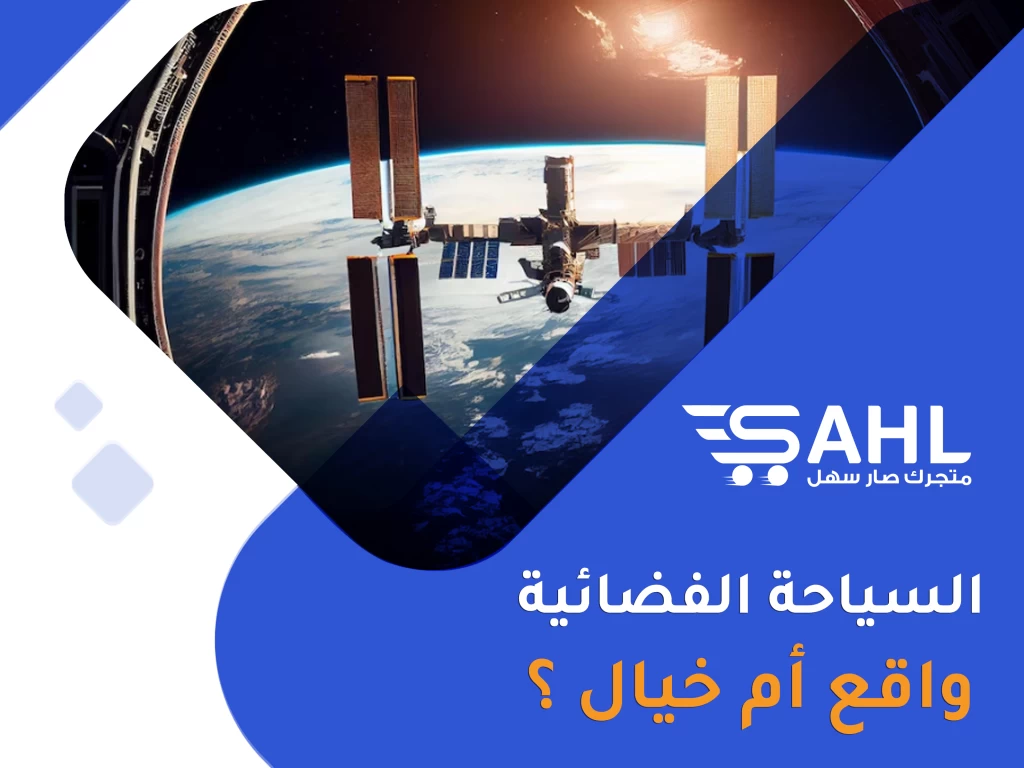Free support 24/7
Free support 24/7

Space tourism is one of the most surprising and challenging ideas in the world of travel and exploration. They seem to take us to new worlds and open previously unimaginable doors. Will we be able to travel to space in the near future? Let's explore this question in depth.
Development of space and space technology:
Since the beginnings of space exploration in the twentieth century, the world has witnessed tremendous progress in space and space technology. Spacecraft have been developed capable of transporting humans into space and exploring other planets. Among these vehicles, we find the International Space Station, which hosts astronauts from all over the world for long periods. This reflects the great progress that has been achieved in the field of human spaceflight.
Private companies in the race:
In addition to government space agencies such as NASA and Roscosmos, private companies entered the scene and began to play a decisive role in the development of the space travel industry. Companies such as SpaceX and Blue Origin are developing advanced space technology and planning to organize tourist trips to space. We have already seen some test flights of wealthy individuals into near space.
Future challenges:
Despite significant progress, there are many challenges that must be overcome before we see widespread space tourism. Among these challenges:
Cost of flight: Currently, the cost of space flight is very high, making it unaffordable for many. Technologies and vehicles must be developed that reduce the costs of space travel.
Safety: Space travel requires taking safety seriously, as space travelers face risks such as radiation and harsh environmental factors.
Sustainability: Space tourism flights must be environmentally and technologically sustainable to avoid negative impacts on outer space.
Technological progress and the future:
The space industry is witnessing rapid advancement in technology, opening new doors for space tourism. Space transportation is constantly evolving to become more efficient and safer. For example, we have seen significant development in reusable rocket technology that enables the cost of spaceflight to be reduced.
Space tourism destinations:
The proposed space tourism destinations have varied. In addition to visiting the International Space Station, commercial projects have been presented to visit the Moon and even some other planets such as Mars. This is a major engineering and technological challenge given the long distances and harsh environmental conditions in these places.
Insurance and safety:
Strict security measures and careful safety protocols will be necessary to protect space travelers. There may be extensive training for travelers to deal with emergency situations in space and how to interact with the space environment.
Environmental and ethical impact:
We should also discuss the environmental impact of space tourism. The industry must develop environmentally friendly technologies and reduce its impact on outer space. In addition, ethical codes must be established to ensure sustainable exploitation of space and the preservation of the places we visit.
Economic challenges:
Space tourism also faces economic challenges, as it requires huge investments to develop the necessary technology and infrastructure. However, some believe that space tourism could expand the customer base and boost the global economy.
Cultural and social challenges:
As space tourism expands, cultural and social challenges will arise. These challenges will include issues such as recognizing the rights of space travelers and how to handle social interactions in limited surroundings such as spacecraft. International communities will need to put in place legislation and regulatory systems to ensure space tourism is fair and responsible.
Education and awareness:
There will be an urgent need to educate the public about the technical and scientific matters related to space tourism. Awareness campaigns should be conducted to explain the importance of space, its risks and benefits. There must also be educational efforts to qualify space travelers and prepare them to face the space environment and make the most of their experience.
Innovation and scientific benefit:
In addition to the entertainment and tourism aspects of space tourism, we must seek to benefit scientifically and researchally from these trips. Scientists and researchers can take advantage of the opportunity to conduct advanced scientific experiments in space and better understand physical and biological phenomena in the space environment.
International organization:
Space tourism requires careful international regulation to ensure safety, security and international cooperation in this sector. International standards must be established to evaluate and monitor space activities and international agreements must be developed to ensure effective cooperation and participation between countries.
Ethics and human rights:
Space tourism will also require thinking about ethics and human rights in space. The international community and space industry will need to establish standards to protect the rights of space travelers and ensure that they are treated fairly and with respect.
Innovation and competitiveness:
Space tourism has the potential to stimulate innovation in multiple areas, including developing more efficient and safer space transportation, improving space living technology, and developing renewable energy resources for use in space.
Direction and vision:
It will be necessary to develop a long-term strategic vision for space tourism, and stimulate innovation and investments in this sector. This vision should help guide future developments of the industry.
Communication with the public:
Industry and governments must have effective strategies to communicate and educate the public about space tourism. Awareness campaigns should encourage sustainable thinking and positive participation in the industry.
Technical and financial challenges:
Space tourism will face significant technical and financial challenges. It will need development and operation
This sector requires huge investments and continuous modernization of technology and infrastructure.
Space security and control:
It is important that we take space safety and control issues seriously. Systems and protocols must be established to monitor and regulate movement in outer space to ensure that unwanted collisions or encroachments do not occur. There must be procedures to address security threats in space.
Space tourism and environmental balance:
Space tourism will need to consider the balance between space activities and protection of the space environment. Environmentally friendly technology must be developed to reduce the impacts of human activity on space and reduce the generation of space waste.
Strengthening global partnerships:
Space tourism will require strengthened international partnerships to ensure success and safety. Countries, space agencies and space companies must cooperate in areas such as sharing information, providing emergency assistance, and ensuring public safety in space.
Education and public awareness:
Awareness and education about space tourism remains important. The public should be encouraged to understand the risks and benefits of this type of travel, and individuals should prepare well and adhere to space guidelines and laws.
Sustainability and social engagement:
It will be essential to promote sustainability in space tourism and public participation in updates and decision-making. This can be achieved by investing in sustainable technology and continuing communication with the public to make space tourism more sustainable and transparent.
Health and medical challenges:
Space travelers will face unique health challenges on their journeys into space. For example, they will need to deal with the health effects of exposure to cosmic radiation and zero gravity. Medical technologies and protocols must be developed to maintain the health of space travelers and address health problems that may arise.
Regulation and safety:
Space tourism requires strict regulation and management to ensure safety and avoid accidents. Careful safety standards must be established and adhered to in all aspects of spaceflight, from spacecraft preparation to launches and landings.
Cost and possibility:
It is important to address the issue of cost and affordability. Currently, space travel is very expensive and not available to the public. The possibility for many people to participate in space tourism experiences should be expanded by reducing costs and providing multiple travel options.
Space organization and space waste:
We should pay attention to monitoring outer space, preventing the accumulation of space waste, and maintaining space cleanliness. That space waste, such as old satellites and abandoned spacecraft, can pose a danger to modern spacecraft and to outer space itself.
Education and public awareness:
Awareness and education about space tourism remain important. The public should be oriented on what the challenges and possibilities are and how to contribute to shaping the future of the industry. This awareness contributes to encouraging interest in space and increasing support for this type of travel.
Economy and investment opportunities:
Space tourism will provide enormous economic opportunities. It will create new job opportunities in various sectors such as space transportation, hospitality, entertainment and technology. Developing this industry will require significant investments, which will boost local and global economies and support economic growth.
Technological development and innovation:
Space tourism will encourage advances in technology and innovation. This industry will play a major role in the development of space technology and will have a positive impact on innovation in a variety of industries. For example, research in areas such as food, medicine, and materials may lead to new discoveries useful to humans.
Social and cultural influence:
Space tourism will contribute to changing the social and cultural conscience. A new culture will emerge around space and space travel, and spaceflight will broaden human horizons and enrich cultural experiences. It will enable us to think more deeply about our place in the universe and our impact on the space environment.
Education and scientific research:
Space tourism will encourage interest in education and scientific research. It will provide opportunities for scientists and researchers to study space and collect data and information that can contribute to a better understanding of the universe and the advancement of science.
Sustainable development and charitable work:
Space tourism can play a role in supporting sustainable development and philanthropy. Proceeds from this industry can be used to fund development and humanitarian projects on the ground, contributing to helping people experiencing poverty and need.
Ethics and human values:
Space tourism will have an impact on human values and morals. This industry will contribute to promoting values such as international cooperation, peace and mutual respect, through interaction between different cultures in space and joint work in space exploration projects.
Innovation and technological development:
Space tourism will promote technological development and innovation in multiple fields. It will encourage the development of new technologies for transportation and accommodation in space, opening doors to utilize these technologies in everyday life on Earth.
International relations and cooperation:
Space tourism will be an important factor in promoting international relations and cooperation between countries. This industry will provide opportunities for international cooperation in the areas of research, technology and trade, and will contribute to providing a platform for international dialogue and common understanding of global challenges.
Education and public awareness:
Space tourism will contribute to increasing awareness and education about space and space science. It will inspire rising generations to become interested in science, technology and exploration, and promote education and scientific research in these fields.
Security and political challenges:
Space tourism will face security and political challenges
Related to monitoring activities in space and protecting national interests. States and space agencies must cooperate in developing policies and laws to control space and ensure safety.
The near and distant future:
Despite the great challenges and opportunities that space tourism offers, we must remember that it is not an experience for everyone at this time. Access to space may require expensive technologies and resources, and some things may take time to become publicly available.
Conclusion:
Space tourism is an area full of opportunities and challenges, and if handled carefully and wisely, it will play an important role in shaping the future of humanity. This industry will represent a major shift in human history, and will give us the opportunity to benefit from the benefits of space exploration and international cooperation in order to achieve progress and development. We will have the opportunity to explore space and communicate with the universe in a way that enhances our position in the entire universe.

الذكاء الاصطناعي كان يُعتبر حكر على الشركات الكبيرة لكن اليوم صار أداة متاحة حتى للمتاجر الصغيرة

روبوتات المحادثة انتشرت بشكل كبير في المتاجر الإلكترونية والتطبيقات لكن كثير يتساءل هل فعلًا ترفع المبيعات أو هي مجرد ترند
You can create your store easily